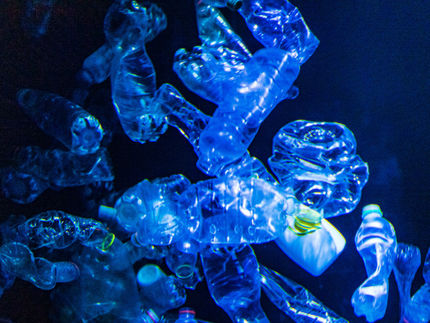New leather alternative: plastic-free, vegan and biodegradable
DBU supports green start-up Revoltech GmbH
Advertisement
Leather or artificial leather is indispensable for many products such as clothing, shoes and accessories, but also for car interiors. Darmstadt-based start-up Revoltech GmbH has developed a new leather alternative. The advantage: no animal products, no problematic chemicals and no fossil raw materials - a real opportunity for a more environmentally and climate-friendly industry. The German Federal Environmental Foundation (DBU) has funded the further development of the material with around 125,000 euros. The start-up's first success: a collaboration with the VW Group.
"Rapid scalability and greater environmental protection"
DBU Secretary General Alexander Bonde emphasizes the startup's trump cards: "In addition to the resource- and environmentally friendly approach, the three founders of Revoltech largely rely on established manufacturing technologies from various industries. This leads to rapid scalability of production - with positive effects for greater environmental protection." Under the project name Lovr (short for leather-like, oil-free, vegan, residue-based), the leather alternative is made entirely from plant-based residues and does not contain any animal components or petroleum-based plastics, as is common in conventional artificial leather, according to the company.
Hemp fibers are ideal for leather alternatives
The Revoltech team, which now consists of 14 people, says it uses hemp straw - a by-product of agricultural hemp production that, according to production manager Dr. Lukas Schell, has hardly been used to date. Schell continues: "Hemp grows quickly, requires hardly any water or pesticides and improves soil quality." A patent application for the production process was filed in July 2021. Nevertheless, a large part of the production process is based on existing technologies that have been adapted for Lovr. "This reduces development costs and enables seamless integration into existing production chains," says Schell.
The main motivation is a genuine circular economy
Revoltech's aim is to create a high-quality leather alternative with a comparable feel and quality - but without the negative ecological impact of conventional leather production. According to Schell, the main motivation is a genuine circular economy: "The industrial processing of animal skins requires large quantities of water and often does not do without chemicals that are harmful to health or the environment - just like almost all synthetic leathers that are based on crude oil. We consciously avoid all of this." Thanks to the use of regional hemp residues and other natural components, the product is biodegradable according to Schell - should the material end up as waste at the end of its life cycle.
Funding from the DBU boosts quality
Production manager Schell explains Revoltech's process: "We use regionally produced hemp, extract the fibers from the hemp straw and combine them with plant-based binders as well as natural colorants and fillers." The mixture is then dried, pressed and processed into rolls. "Thanks to the DBU funding, we were able to significantly improve the quality of our leather alternative - in terms of color, texture and finish," says Schell. The material can now be produced in different thicknesses and with different surfaces, for example embossed or sanded. Revoltech is working on the final industrialization and market maturity of these processes in corresponding follow-up projects.
VW cooperation brings entry into the automotive industry
A strategically important step into the market for Schell is the cooperation with the Volkswagen Group. The aim is to optimize Revoltech's artificial leather alternative for various applications in vehicle interiors - for example as a replacement for plastic foam films on the dashboard or on the inside of the doors. However, Schell also sees great potential for applications in other sectors: "We are particularly advanced with shoe insoles and accessories such as watch straps." In principle, the material can be adapted for numerous areas of application together with industry partners.
Note: This article has been translated using a computer system without human intervention. LUMITOS offers these automatic translations to present a wider range of current news. Since this article has been translated with automatic translation, it is possible that it contains errors in vocabulary, syntax or grammar. The original article in German can be found here.























































